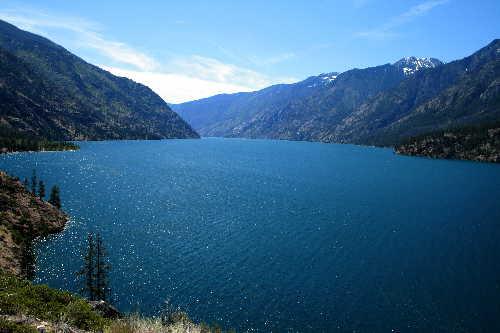Stretching over 50 miles from the town of Chelan to Stehekin, this is the largest natural lake in Washington. Consult the Sport Fishing Rules pamphlet for specific regulations at this lake.
Fishing for Kokanee is usually best from mid-April through June. In June and July, catchable-size Cutthroat Trout are planted and anglers targeting these fish have been having great success in recent years on fish averaging 12 inches with some reaching 17 inches or more on occasion. Anglers after trophy fish have a chance to catch Lake Trout (mackinaw) as well as land locked Chinook salmon. The state Lake Trout record has been broken several times here over the years, including the latest occurring in February of 2013, which weighed in at 35.63 lbs. Naturally producing landlocked Chinook are in relatively lower abundance than other targeted species and are occasionally and incidentally caught while targeting Lake Trout and Kokanee. A fairly good Smallmouth Bass fishery with some quality fish exists in the lower portion of the lake near Chelan and Manson.
The Washington Department of Health (DOH) issues fish consumption advisories for Lake Chelan. For more information, contact the DOH Office of Environmental Health Assessments at 877-485-7316 or see a list of advisories by water body.
Two-pole fishing is allowed
Shoreline access: Good - Numerous boat launches and public docks offer opportunity to catch fish from the shoreline. The shoreline on the upper portion of the lake is mostly USFS land, providing opportunities for shore access.
Species you might catch
- Bridgelip sucker
- Burbot
- Chinook salmon
- Chiselmouth
- Kokanee
- Lake trout
- Largemouth bass
- Largescale sucker
- Peamouth
- Pygmy Whitefish
- Rainbow trout
- Signal crayfish
- Smallmouth bass
- Tench
- Threespine stickleback
- Westslope cutthroat trout
- Northern pikeminnow
Lake information
County: Chelan
Acreage: 32622.70 ac.
Elevation: 1102 ft.
Center: 48.030244, -120.344078
Open in Google Maps
Catchable fish plants
| Stock Date | Species | Number Released | Number of Fish Per Pound | Facility |
|---|---|---|---|---|
| Jul 11, 1995 | Rainbow | 12,450 | 3 | CHELAN PUD HATCHERY |
Fishing prospects calendar
Rainbow trout
Kokanee
Largemouth bass
Smallmouth bass
Northern pikeminnow
Photos
